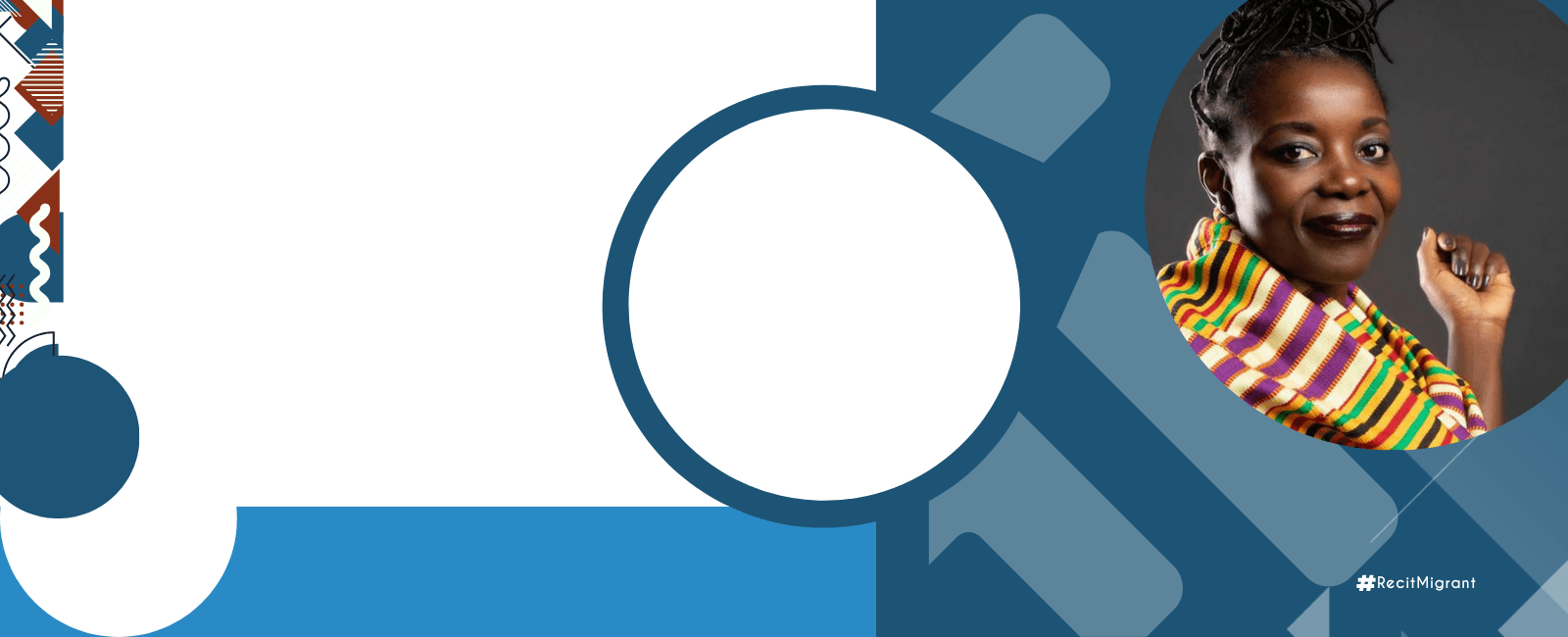

It is quite common to hear about Western expatriates in Africa. But very little is said about African expatriates living and working in other African countries. And yet this reality exists and is deserving of recognition. Sandra Idossou, a Beninese professional, exemplifies this experience. For several years, she has built a successful career across the West African sub-region, training staff for a hotel group and later launching her own ventures. Dialogue Migration invites you to discover the inspiring journey of Sandra Idossou, a proud Afropolitan who returned permanently to Benin in 2017. Passionate about community, Sandra is dedicated to supporting local artisans, promoting social and community initiatives, and advocating for environmental conservation.
Sandra Idossou welcomed us one afternoon in April 2025 at her art gallery on Route de l’Aéroport in Cotonou. Surrounded by objects and products crafted by Beninese and other African artisans, she shared her story. Sandra returned to Benin in 2017 after spending 19 years abroad in seven African countries i.e. Ghana, Togo, Nigeria, Chad, Rwanda, Gabon and Congo Her journey across the continent began in 1999, driven by both professional commitments and family life with her husband. During her time abroad, she worked for a French hotel chain, training staff across the 21 African countries in which the company operated. In 2006, she founded her own training company, which took her across Africa and around the world.
Sandra Idossou began her professional journey after studying languages (French, English and German) at an institute in Ghana, followed by hospitality training at a hotel and tourism school in Benin. She joined a newly established hotel group in Ghana as a Receptionist after completing an internship. In 1999, she was transferred to Cotonou, Benin, where she spent two years as Reception Manager. Her career took a significant turn in 2000 when she traveled to France to complete a Training of Trainers course. That same year, she began conducting staff training in the hotel group’s establishments across 21 African countries.
“For six years, I spent a week in each country, training staff in customer service and customer relations. It involved a lot of travelling. From 2000 to 2006, travelling across Africa every week was challenging, there weren’t always direct connections between countries. Even though I loved discovering new places, by the third or fourth year, I just wanted to stop and settle in one place instead of constantly being on the move,” Sandra Idossou narrates to Dialogue Migration.
Nevertheless, Sandra didn’t give up. Despite the demanding travel and the challenges of being a young woman working across the continent, she found the experience quite rewarding.
“When I finished, I resigned and launched my own company in 2006,” she explains. “I returned to Ghana to join my husband who had been transferred there. That’s where I set up my business and began offering training courses.”
As a consultant and trainer, Sandra Idossou works with companies to enhance every aspect of their customer service. Her mission is to help businesses stand out even when offering the same products or services, by empowering their staff to deliver exceptional services.
Perceptions of an African expatriate in another African country
“My husband is a civil engineer, so he was the first to be offered an expatriate position,” Sandra explains. “He received the same salary base and benefits as French engineers, but achieving those same benefits wasn’t automatic. We had to literally fight for it.”
Sandra acknowledges that her sociable and open personality helped her build strong relationships in every country she lived and worked in. “I have to say, I’ve never experienced racism in Africa, at least, not in the countries I’ve worked in,” she says. “Before us, it was usually white trainers from France who conducted the sessions. When we arrived and people saw that the trainers were Africans this time, they were proud. There were five of us in total,” she recalls.
The training team consisted of five professionals from across West Africa: a Beninese, a Ghanaian, a Guinean, a Togolese and an Ivorian. Each brought their own area of expertise and travelled across the 21 countries, offering training once a year in each location.
“I remember my first time in South Africa,” Sandra recalls. “There was concern that white South Africans might struggle to accept our expertise. But once you start speaking and people realise you know your subject, things go really well.”
Over the course of her career with the hotel group, Sandra conducted training sessions across East Africa, North Africa and even in Mauritania. “There was only one assignment I didn’t make it to…Algeria – because of a visa issue,” she explains. “But we trained everywhere else, even in places like Mauritania, where the population is largely Moorish. For them to see a woman come in and lead a training session was something utterly remarkable.”
Challenging the myth of Africans’ European dream
For Sandra Idossou, being African and living on the continent has always been a source of pride and joy. She speaks warmly of the hospitality she’s encountered across Africa, noting how welcoming most countries are to foreigners. However, she mentions one exception ofa country in Central Africa where locals viewed foreigners with suspicion, seeing them uniquely as job-stealers.
“I have an African background. I didn’t study in Europe. My parents live in Germany, but I never wanted to live there,” she says. Despite multiple opportunities to relocate, Sandra has always preferred to visit Europe for holidays or business rather than settle there.
“I’m African, I love Africa, and I’m proud to live and work here,” she affirms. “We really need to move past the idea that all Africans want to go to Europe. I’ve had opportunities, but I never felt the desire.”
She recalls a telling moment during a training course in the south of France: “I remember saying how excited I was to finish and go back to Africa. One of the young women looked at me, surprised, and said, ‘Oh, you’re going back to Africa?’ I said yes. She was stunned. ‘But I thought all Africans wanted to come live in Europe,’ she said. I told her, ‘No, I’m in a hurry to get home.’ She looked at me like she’d never heard any such thing.”
“The image often portrayed is that all these poor Africans just want to come to Europe,” Sandra Idossou says. “But I had a very good life in Africa, and I wasn’t interested in their way of life. I would go for training or holiday, nothing more. I never dreamed of living there, even though I had plenty of opportunities.” She shares an example: “I did a work placement in Germany, and at the time, I could have easily gotten a place to live if I wanted to. But I was never interested. My mother has lived in Germany for 35 years. I have family there and every reason to stay if I chose to – but I choose not to.”
African migration debate on the continent
Sandra Idossou finds the ongoing debate around African migration deeply compelling. Yet, she admits to feeling a twinge of guilt when thinking about young Africans who go abroad to study, often funded by the hard-earned money of their parents back home, only to decide not to return. “They finish their studies and choose not to come back to help build Africa,” she says. “And then they come here on holiday and complain that nothing is progressing. But if those same people came back and contributed, Africa would move forward much faster,” she laments.
However, Sandra is also realistic about the challenges of returning. Drawing from her own experiences, she emphasises the importance of preparation and realistic expectations. “We also need to create attractive local opportunities,” she notes. “If you’ve been working abroad and you come back only to be offered a salary that doesn’t reflect your skills or experience, adapting isn’t easy. You really have to know WHY you’re coming back.”
Sandra Idossou is deeply saddened by the desperation that drives some Africans to risk everything in search of a better life elsewhere. “People think that everything around them is dead and that only in the West can they succeed,” she says. “I find that rather sad. But I honestly don’t know what makes them so desperate.”
Homecoming and commitment
Now actively involved in the arts and crafts sector, Idossou is proving that creative industries can be powerful engines of change and key contributors to national economic development. Through her work, she demonstrates that building a life and career in Africa is not only possible – it is, in fact, valuable.
She is a strong advocate for African mobility within the continent. “It’s important for Africans to be open to and stay focused on what’s happening across Africa,” she says. “We often think the best opportunities are in the West, on the other hand, many of them are just across the border in neighbouring countries. Sometimes you just have to look around to realise how many possibilities exist right where you are.”
As president of the association Engagement Action Sociale (Social Action Commitment), Sandra Idossou is more than a businesswoman, she is a committed activist. After returning to her native Benin in 2017, she immersed herself in social causes, most notably with the #SachetHéloué campaign, which raises awareness about the environmental dangers of plastic bags in the country.
Her advocacy contributed to a major milestone. The Beninese parliament passed a bill banning the use of plastic bags. For Sandra, this campaign is nothing less than “the commitment of her life.”
Her activism doesn’t stop there. From mobilising communities to build a school in a rural village, to championing local consumption and the promotion of Beninese crafts, Sandra adds, “These are small things, but if everyone does small things, we’ll certainly get there.”
Since her return to Benin, Sandra Idossou has occasionally reflected on the trade-offs between her social commitments and her professional career. “Sometimes I regret that I’ve done so much on the social front and not enough on the professional side, where I could be earning foreign currency,” she admits.
Yet giving up is not an option. Her dedication runs deep. “When it comes to my commitments, I really can’t help it. I’ll keep using my voice and my time to go into schools, to raise awareness and to organise activities for children. Because if, ten years from now, they grow up understanding certain things, then I’ll have contributed something. I won’t have lived in vain. So I’m going to keep doing it.”
In recognition of her tireless work and social impact, in January 2024, Sandra Idossou was awarded the title of Chevalier de l’Ordre National du Mérite de la France (Knight of the National Order of Merit of France).
Recently Published
Subscribe to our newsletter!
Quick Links


